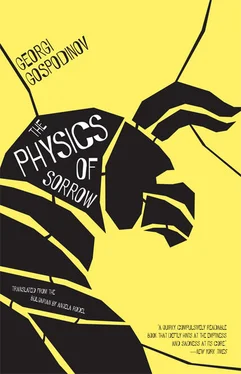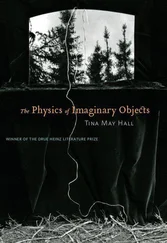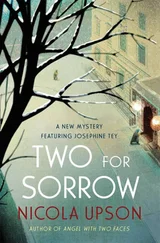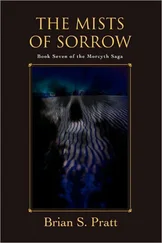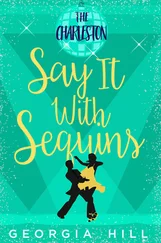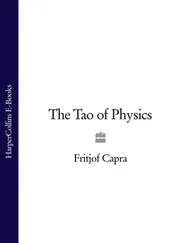I did everything possible to make a life for us there, but my melancholy, instead of scattering, only deepened. I grew ever gloomier and more withdrawn. In such moments I wanted to spare others my presence — my daughter most of all. I started accepting all sorts of literary invitations, even for second-rate festivals and residencies in other countries and cities. Before I left, she gave me her favorite dinosaur. I’ve always kept it with me.
I imagine how some day in the future, when she is telling stories to her own children, she’ll start with the line: “My father and the dinosaurs disappeared at the same time. ” which is a good beginning, or rather, end.
GLOBAL AUTUMN
Now here I am. Following an autumn all over Europe. In the beginning a chestnut tree in Berlin fell just a few feet from me, then several fall leaves slowly fluttered down in Warsaw, enough to set fire to all of Europe, I watched it landing over Normandy, I walked beneath the seemingly ablaze (or rusting) chestnuts of Sibiu, stood stunned before a burning blackberry bush in Wrocław, walked in the buffeting wind in Gent and watched the endless November rains through the windows of an attic room in Graz.
Cities that look empty at three in the afternoon
Graz
Turin
Dresden
Bamberg
Topolovgrad
Edirne
Mantua
Helsinki
Cabourg
Rouen
The wounded Jesus from Caen, Normandy, in the church knocked askew by the bombings in 1944. All that’s left of him is his head with the crown of thorns, his wooden torso is scorched, his arms blown off by shells. He has no legs.
The marble Jesus with a shattered right hand in the half-destroyed church on Ku’Damm.
Europe’s maimed Jesuses.
The small towns of Normandy gasping under the historical shell of their own past, of fortresses and cathedrals. A dozen centuries ago, they were grand; now they are provincial. There’s a cause for historical melancholy for you. The only thing left for them is to nobly bear both their fame and their oblivion. Falaise is a town of 8,000 with an enormous chateau and fortress wall. The birthplace of the man known as William the Conqueror to some and William the Bastard to others. After seven o’ clock the town is deserted, I almost said “devastated.” It smells of hay and herbs. No fortress wall can stop the merciless cavalry of the hours.
Rouen. First scents. Of lilies. strong and devout along the city’s abbey. And immediately a memory of my grandma’s house, the lilies at the back of the yard, on the way to the outhouse. Everything seen is projected somewhere there, in the lost country of childhood. The ideal city lies there, the heavenly city, which has already happened to us, and in all of our later wanderings, we can only note its likenesses — sometimes more felicitous, sometimes not. The second scent I add to the catalogue is that of urine, again here by the cathedral. The homeless people who sleep nearby are already gathering up their cardboard bedding.
Alone, I stroll through the Saturdays and Sundays of the world, which is always very family-oriented on those days. And everyone is laughing, they’re laughing, it’s unbelievable. With the lightness of laughter that takes pleasure in life. Laughter for no visible reason. Not throaty, obliterating, sardonic or hysterical laughter. Rather the laughter of lightness that you’re enjoying a nice day, rolling around in the meadows of the world with other people rolling around carefree.
In one edition of the Süddeutsche Zeitung , I saw a picture of the already elderly Horkheimer at some celebration at Frankfurt University in distant 1952. A round face, grinning awkwardly, holding a carnival stick with a paper ball hanging from its end. As if the aging philosopher was feeling slight guilt at having been swept up in the festivities and some fear that, at any moment, his friend Adorno would appear and give him a stern and judgmental look. Hey, I’m not even enjoying myself, the grinning Horkheimer from the photo seems to be saying in his defense. And please let that be taken as an extenuating circumstance mitigating my guilt.
The best thing about provincial European museums of fine arts is that they do not show us the high points — despite the fact that they all have a Renoir or two, a Monet, and, of course, a Picasso, who keeps the whole museum industry afloat — but they do show us the intensity of a life without geniuses. The art of good, second-string paint-slingers, who, to be frank, are more interesting to me now. The seventeenth and eighteenth centuries were swarming with artists who didn’t stand much of a chance.
I stood for a long time, disconsolate, in front of a painting by Tilborch, “Banquet Villageois.” Feasting peasants, captured at the very end of the celebration, breaking up into groups. Such sorrow, coming up from below. the deep sorrow of the belly. The stomach is sated, yet joy has not come in any case, or has already departed. Sorrow from the seventeenth century.
Directional signs in the Museum of Fine Arts in Rouen
ROMANTISME 
IMPRESSIONISME 
NATURALISME 
CUBISME 
TOILETTES 
As I make the rounds of the world’s museums, I seem to meet one and the same group of old men shuffling stiffly and fragile old women with white hair, curious in their late meeting with the world’s art. At first, I used to think how tragically late this group is. Then I slowly began to realize, drawing nearer to their stiffness and fragility, that the meeting was right on time. From the eternity of the old masters toward another eternity — such a smooth transition.
I’m standing on a square in Pisa, looking at faces. I’ll never get tired of it. After the hunger for faces which I experienced in those basements and ground-floor apartments and lonely afternoons, I find the human face our creator’s greatest accomplishment.
People have gotten more beautiful. No, it’s not just another sign that I’m getting old. Or at least, it’s not only that. People really have gotten more beautiful. The women in particular, of course. Especially the women.
Rome — an abandoned city. Sunday.
I will add these to the list of cities’ first scents: asphalt melted by the sun in the late afternoon (a scent from childhood), the heavy scent of roses and a hint of rot. If something in nature can be pushed to the point of kitsch (since culture has done its fair share on that front), it’s the rose. The city is full of roses. Is it to cover up all the death that has accumulated throughout the centuries? All graveyards smell like roses.
The sunset on this day will catch me on a hill, in the garden of a monastery founded by the Knights of Malta, with oranges rotting on the grass and ravens pecking at the fruit’s flesh. Momentary epiphanies, which will disintegrate in the next instant. Which raises their value a hundredfold. For a few minutes, the sunset of the Roman Empire and the sunset over the Roman Empire mean one and the same thing. The nocturnal barbarians can be heard, racing along on their Vespas and Piaggios.
You don’t quite connect with some cities, just like you don’t quite connect with certain women. You meet them either too early or too late. Everything is set for your meeting, but some random whim makes you suddenly turn down some other street.
Читать дальше
